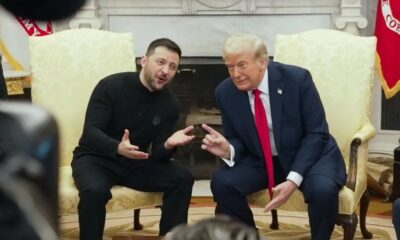Africa
Sudan: Urgent need for civilian protection in wake of escalating violence

Reports indicate that on February 12, armed forces targeted several villages in the Al-Kamlin area, leading to widespread destruction and alleged human rights violations. Villages such as Kombo Ronga, Kombo Hala Zalingei, Al-Burkan, and Tulba were reportedly set on fire.
Civilians have faced looting, forced displacement, and targeted violence. The extent of casualties remains unclear, but reports suggest significant loss of life and property. Allegations of ethnic-based targeting and human rights abuses have been raised by local organizations.
The region has seen continued violence over recent months, with prior incidents in January resulting in multiple fatalities. The Sudanese army has acknowledged certain violations but has not provided details on accountability measures.
The international community has imposed sanctions in response to the situation. The U.S. sanctioned Sudanese army leader Abdel Fattah al-Burhan on January 16, 2025, citing attacks on civilians. Canada followed with similar measures on March 6, 2025, targeting Sudanese military officials.
Conclusion:
The situation in Al-Qanabi remains critical, with ongoing violence and humanitarian concerns. Further independent investigations and international engagement are necessary to assess the scale of the crisis and address accountability issues.
Africa
Algeria commemorates thousands killed by French troops in 1945 massacres

As Europe celebrates the 80th anniversary of its triumph over fascism and the end of World War II, Algeria is remembering a darker anniversary: the colonial-era massacres that erupted the same day.
In ceremonies in Guelma, Kherrata and Setif, the cities where the massacres took place, Algerians paid homage to those who were killed.
In a message this week, President Abdelmadjid Tebboune framed the event as a matter of national pride and prelude to the country’s fight for independence after 132 years of French colonialism.
Algeria’s ministry of war veterans is marking the anniversary with a series of events under the slogan, “A people without memory is a people without a future.”
The fight for independence
More than 500,000 tirailleurs (light infantry) from North Africa, West Africa, and Madagascar fought for France during World War II. Some volunteered. Others were forcibly conscripted. Many, including more than 100,000 Algerian tirailleurs, hoped their sacrifices would secure them greater rights.
But when the war ended, Algerians who dared to demand them were met with repression and violence, even as then-Gen. Charles De Gaulle exalted how “the cause of liberty and justice” had prevailed in a radio broadcast throughout France and its colonies, including Algeria.
On May 8, 1945, Algerians filled city streets in Ain Temouchent, Guelma, Kherrata and Setif, waving flags and reviving pre-war calls for independence. Protesters were met with police fire. Violent anti-French riots broke out, killing more than 100.
France subsequently launched an air and ground offensive that killed thousands of Algerians — 45,000 according to Algerian authorities and around 3,000 according to French statistics.
No official apology from France
Tebboune and French President Emmanuel Macron announced a truth commission-style “dossier de memoire” in 2022, led by a committee of historians from both countries. Yet, its activities have stalled amid deteriorating relations over issues such as immigration and how France juggles ties between Algeria and its regional rival Morocco.
Daho Djerbal, an Algerian historian who has written extensively on the events of May 8, 1945 and interviewed many survivors, said that day was a turning point in the country’s history when Algerians began to seek independence.
And, he said, France “has never acknowledged that they committed a mass murder. That’s the current term; we can call it a crime against humanity or a war crime. There was no declared war against the Algerian people. And we sent the air force, the navy, and field artillery to suppress a demonstration.”
French leaders, including Macron, have called for truth and recognition but stopped short of fulfilling Algeria’s demands for a formal state apology.
A delegation of around 30 French lawmakers from left and centrist parties arrived in Algiers on Wednesday to participate in the commemorations of the massacres.
Africa
Syria holds indirect talks with Israel to prevent escalation
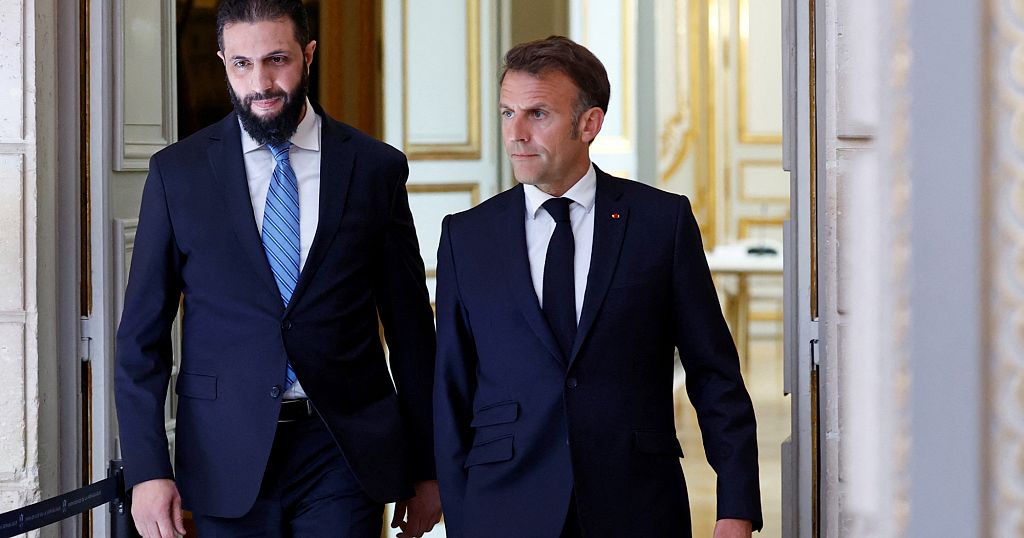
Syria’s interim President Ahmad al-Sharaa said Wednesday that his country is holding indirect talks with Israel to prevent recent hostilities from getting out of control.
He spoke on his first visit to Europe since taking office in January, and as he seeks to broaden ties to Western countries.
Israel carried out a series of airstrikes on parts of Syria last week, saying it aims to protect the country’s Druze minority from coming under attack by pro-government gunmen.
Speaking to reporters in Paris, al-Sharaa said, ″Regarding negotiations with Israel, there are indirect talks through mediators to calm down the situation so that they don’t get out of control.″
He did not say who the mediators are.
There was no immediate public comment from Israel.
Israel has its own Druze community and officials have said they would protect the Druze of Syria and warned Islamic militant groups from entering predominantly Druze areas.
Al-Sharaa met earlier Wednesday with French President Emmanuel Macron, who said he would push the EU and U.S. to lift sanctions on Syria to boost its economy.
Macron also called for continued U.S. and international military presence in Syria to fight terrorist groups threatening security in the Mideast and Europe.
Al-Sharaa took power after his Islamist group, Hayat Tahrir al-Sham (HTS), led an offensive that toppled former President Bashar Assad in December.
Assad, a member of Syria’s Alawite minority, ruled for more than two decades.
The Syrian leader’s visit to Paris comes a week after clashes between forces loyal to al-Sharaa and fighters from the minority Druze sect that left nearly 100 people dead.
This followed earlier violence in Syria’s coastal region between Sunni gunmen and members of the minority Alawite sect, which left more than 1,000 people dead, many of them Alawite civilians killed in revenge attacks.
Religious minorities in Syria, including Alawites, Christians and Druze, fear persecution under the predominantly Sunni Muslim-led government.
Al-Sharaa has repeatedly pledged that all Syrians will be treated equally regardless of religion or ethnicity.
The 14-year conflict has killed nearly half a million people and displaced millions.
Syria’s infrastructure lies in ruins, and international sanctions remain a major barrier to reconstruction.
The visit to Paris is being closely watched as a potential test of Europe’s willingness to engage with Syria’s new leadership.
The European Union has begun easing sanctions, suspending measures targeting Syria’s oil, gas and electricity sectors, as well as transport, including aviation, and banking restrictions.
The EU said that it would monitor developments in Syria to see whether other economic sanctions could be lifted, but its 27 member states are divided on whether to go further.
Africa
Reaction in St. Peter’s Square to black smoke on first day of Conclave to elect new pope

The faithful and curious at St. Peter’s Square in Vatican City reacted to the “unique moment” of watching the smoke billow out from the Sistine Chapel.
Italian faithful Deborah Ruffalo said she “waited anxiously and with great anticipation” for the smoke that would signal whether a new pope had been elected or not to pour out of the chimney on Wednesday.
“We’re placing our hopes in tomorrow, which is also a Marian day, the feast of Our Lady of Pompeii, so surely a Pope under the sign of Mary in the month of May and tomorrow we hope to experience this unique moment here,” she said.
Outside in St. Peter’s Square, the scene was festive as thousands of people flocked to the piazza to watch the proceedings on giant video screens, applauding when the Sistine Chapel’s doors slammed shut and the voting began.
They waited for hours, watching screens that showed just a skinny chimney and occasional seagull. After the vote dragged on to dinnertime, some left in frustration, but those who stayed cheered when the smoke finally billowed out.
The cardinals were sequestered from the outside world Wednesday, their cellphones surrendered and airwaves around the Vatican jammed to prevent all communications until they find a new pope.
Francis named 108 of the 133 “princes of the church,” choosing many pastors in his image from far-flung countries like Mongolia, Sweden and Tonga that had never had a cardinal before.
His decision to surpass the usual limit of 120 cardinal electors has both lengthened the amount of time it takes for each vote to be processed and injected more uncertainty into a process that is always full of mystery and suspense.
-
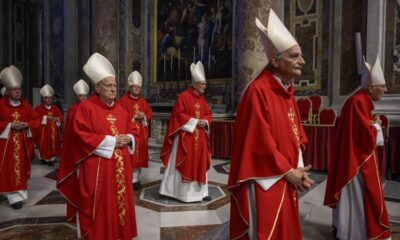
 Europe2 days ago
Europe2 days agoLive updates: New pope to be elected by the conclave
-
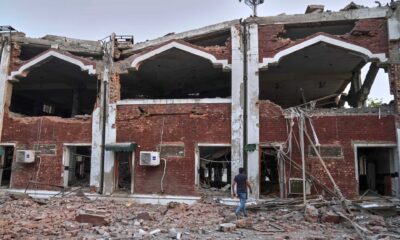
 Conflict Zones2 days ago
Conflict Zones2 days agoOperation Sindoor: What’s the significance of India’s Pakistan targets? | India-Pakistan Tensions News
-

 Europe2 days ago
Europe2 days ago‘What president ever talks like that?’: Biden criticizes Trump for Ukraine stance and threats to Panama, Greenland and Canada
-
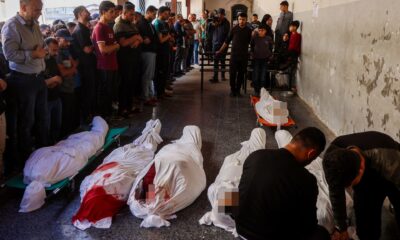
 Middle East20 hours ago
Middle East20 hours agoUN experts warn of ‘annihilation’ as Gaza deaths mount | Gaza News
-
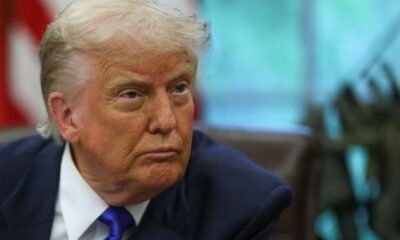
 Middle East1 day ago
Middle East1 day agoWhat does the truce between the Houthis and the US mean for Yemenis? | Houthis
-
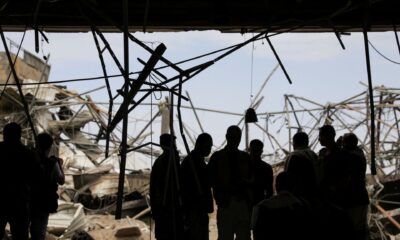
 Middle East1 day ago
Middle East1 day agoThe Take: What does Israel’s escalation with the Houthis mean for Yemen? | Houthis News
-
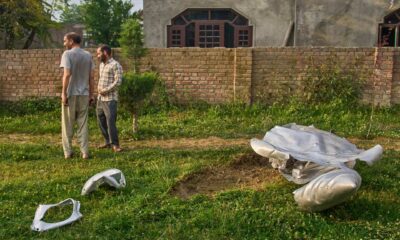
 Conflict Zones2 days ago
Conflict Zones2 days agoInformation war: Are India or Pakistan telling the truth about attacks? | India-Pakistan Tensions News
-

 Education18 hours ago
Education18 hours agoThe best and brightest young scientists are looking beyond the U.S. as cuts hit home



